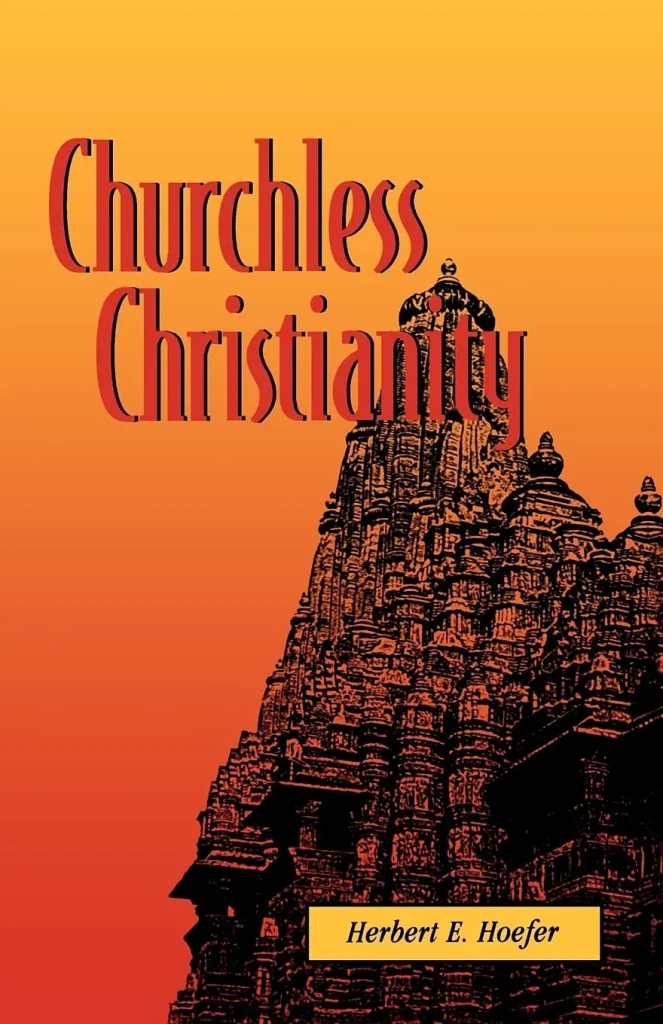Churchless Christianity is a book written by Herbert E. Hoefer, a Missouri Synod Lutheran missionary to India from America. It is based upon his research in the southern state of India, Tamil Nadu, where there are believers who do not get baptised or attend churches because of the sociological challenges that they face. He calls these individuals “non-baptised believers in Christ” (NBBC). NBBC include people from both high and low caste Hindu communities as well as other groups. The book was published in 1991, the research having been done in the 1980s. At the time, NBBC were believed to significantly outnumber publicly Protestant believers in India.
The first two chapters of the book were dedicated to interviews with 84 NBBC in rural Tamil Nadu in an effort to understand their practice, worship, belief, thoughts, and the challenges they faced once they came into faith. In the next two chapters, i.e., chapters 3 and 4, he focused on the capital city of Madras (now Chennai) where he distributed a questionnaire to Muslim and Hindus to learn how they were relating themselves to Christ. This information was transferred into tables to give a better understanding of the survey data. He concluded that “a good one-third of the Madras City population relate to Jesus fairly regularly and fairly deeply in their spiritual life”.

His conclusions about this have (and may still) “trigger” some Western Christians and even the mainline churches in India. However, Hoefer took orthodoxy seriously.
Hoefer dedicated the next two chapters, i.e., chapters 5 and 6, to theologising and bringing practical biblical implications from the interview and survey data. He tried firstly to pin-point the sociological and theological questions that arose from the conditions of the NBBC. He then attempted to construct a practical responsibility from baptised Christians towards the NBBC, especially by constructing a missiological view towards the caste system. From this approach, he developed a new missiological understanding and vision for the church; he also shared his strategies for approaching the people of other faiths.
The last section of this book is dedicated in further reflections on the issue of the NBBC. These include: firstly, whether Christianity in India can include indigenous aspects; secondly, clarifying confusion regarding conversion as it relates to baptism and the church; thirdly, considering the caste system in India from a Western perspective; fourthly, some theological improvements the church needs to make in acknowledgement that the Western import of Christianity in Indian soil eventually negates the cultural aspects of India; and, lastly, the flourishing of Christ-followers but outside the church. The last chapter is a summary and evaluation by H. L. Richard of the book’s arguments, particularly those arising from Hoefer’s survey.
It is mesmerising to see the amount of work Mr. Hoefer undertook in researching the Indian Christ-followers of the late 1980s who neither went to church nor were baptised, but who followed Christ and believed in him like any other Christian. His thorough research helps one to understand the conditions and situations which led the Christ-followers to take (or not take) such steps. His conclusions about this have (and may still) “trigger” some Western Christians and even the mainline churches in India.
All Christians need to give careful attention to how we try to reach and nurture people from other faiths, traditions, and cultures. The book is not just to be read. It should be used as a lens to re-evaluate and re-strategise our church settings, our approach to making disciples of Christ, and our theology.
However, Hoefer took orthodoxy seriously. He did not consider the people who did not take baptism as Christians in the strict use of the term, but he did acknowledge that they were also followers of Christ as much as those who had taken baptism. He saw that the challenges faced by NBBCs were more sociological rather than theological—most of the NBBC faced vitriol and opposition hurled upon them by their particular community groups. This provided a platform for understanding the situation the NBBC were (and still are) in, and he compels readers to put themselves in the shoes of the NBBC. He even shed light on the problem within Christianity itself regarding the varying understandings of baptism between different denominations: this diversity made it even more problematic for the new believers to discern which belief and practice to follow.
It is quite interesting to see that, in his critique of Western approaches to the Indian context, he urged the Westerners to appreciate the caste system. He argued that opposing the caste system completely on grounds of it being a religious function will not be the best practice. Rather, he advocated that using it socially will be more beneficial to evangelism. This approach might be controversial as the evils of the caste system are enormous and Christianity does give a platform for nullifying the implications of the caste system.
Hoefer argued that comparing the caste system with tribalism or communalism is limited as, unlike the caste system, tribalism or communalism does not function hierarchically. His approach looks utopian in that giving a platform for the caste system to function, even in its sociological network, will give rise to the evils that have been witnessed in the past.
I argue the church should take serious steps in eradicating the prolonged evils in the society. As Paul commanded the church about sexual promiscuity that “…among you there must not be even a hint of sexual immorality” (Eph 5:3 NIV), let today’s church also give its full effort to eradicate the evil of caste system not only in the church, but in the society as well.
In conclusion, the book opens a window to a whole unexplored world. All Christians need to give careful attention to how we try to reach and nurture people from other faiths, traditions, and cultures. The book is not just to be read. It should be used as a lens to re-evaluate and re-strategise our church settings, our approach to making disciples of Christ, and our theology. I pray and hope that this issue may be explored, not just in the state of Tamil Nadu, but in other states of India where its relevance looms large.






